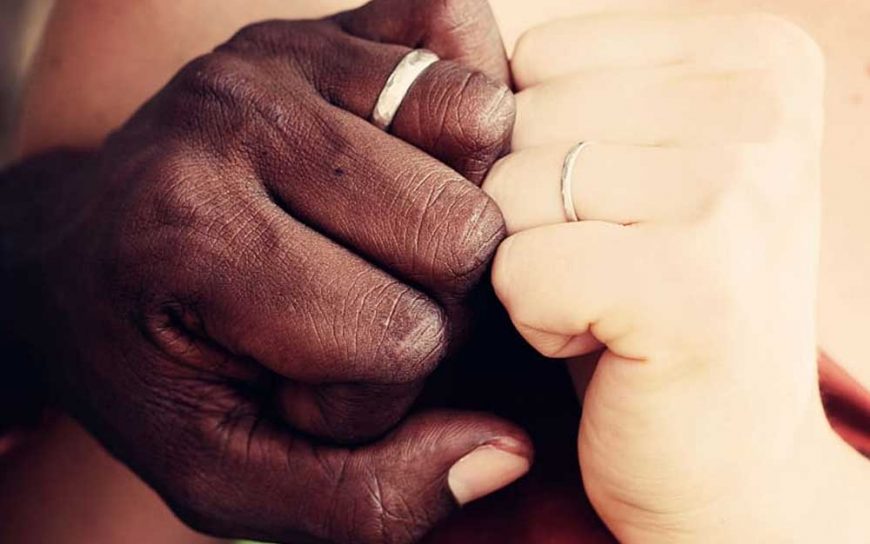The other day I was engaged in a discussion with members of the Chicago Ethical Humanist Circle about how to get rid of all the racial, ethnic and religious hatred that has abounded in the United States, particularly since Trump’s presidency. One member, out of frustration, said that the only way to get rid of this hatred was to encourage mass intermarriage as a means to a more transcendent Ethical Humanist culture based on reason. In other words, the more universal Ethical Humanist culture would replace the more narrow-minded tribal cultures as tribal boundaries melted away through intermarriage.
Sounds like a very rational solution to the problems created by differences between peoples. Just get rid of the differences. Make people pretty much very similar if not all the same. And then, supposedly, people will live in peace and love and harmony and there will be no more wars and conflicts and mass murders and terrorist attacks. I have no problem with people of different backgrounds getting married, on the one hand, although I, as a Jew, worry when a Jew’s intermarriage results in his leaving the religion (which, of course, goes against my Ethical Humanist friend’s perceived purpose for intermarriage). However, in general, I do believe in marriage by choice, and I do believe in a person’s right to marry who he chooses. Furthermore, intermarriage can bring hybrid vigor both genetically and in terms of an exchange of ideas. What concerns me is the thought of this becoming a part of a concerted effort to wipe out all major cultural differences among people. For my Ethical Humanist friend, reason is enough of a life factor to replace ethnicity and religion.
But is it really? Reason is based on defined discrete thought processes that come up with defined discrete rules, precepts, and laws for people. It doesn’t provide the flowing blendable continual stimuli that produce the fundamental preconscious attitudes that create a common worldview for members of a culture and that ground people in their group. Reason creates a delimited infinity of participations in life, whereas ethnicity and religion create a much larger nondelimited infinity of participations in life.
Reason is not as complete of a life system as a tribal culture. Reason creates order, but tribal culture creates flavor, color and vibrancy. Order without flavor, color and vibrancy can lead to an experiential vacuum and numbness. The perfect peace is the peace of death.
So getting rid of tribal culture based on race, ethnicity and religion would be a little bit like throwing the baby out with the bathwater. Perhaps one could create a more harmonious world that way, but only at the cost of getting rid of particular categories of meaningful experiences: those related to personal identity and to a larger group experience.
Intermarried couples follow one of five categories for group attachment: identifying with the husband’s culture, identifying with the wife’s culture, bringing elements of both cultures into a child’s upbringing, identifying with a third culture, or identifying with no tribal culture. Except for five, all the other possibilities are attempts to bond with people from cultures that, nevertheless, unfortunately, have a diminished grounding in the modern external world due to modern technology. Five is the category that breaks away from tribal culture entirely. The category that would include the Ethical Humanists. But if the Ethical Humanists think they are gaining control over parts and aspects of tribal culture through reason, they may be getting some control over their life situations, but only at the price of a more vibrant life narrative. A certain amount of intermarriage, as previously stated, may possibly be stimulating to a culture, refreshing for it. But strong pressure to intermarry by a group like the Ethical Humanists or by the society at large may not only be destructive to a culture, but it may have the opposite effect of having people seeing what is precious in a culture with which they identify and causing them to cling to that culture in many different ways even more than usual. Including becoming more prejudiced against people of other cultures.
Because the United States is a melting pot culture, all the different tribal cultures that are represented in it are alternately refreshed by hybrid vigor and diluted, depending on the particular situation. However, the tribal cultures represented in this immigrant culture may ultimately mostly disappear and be replaced, but not by a culture of transcendent reason. Instead, they will be replaced by a culture of technology: the common denominator behavior pattern for most residents of modern society. So modern Americans will gradually start modeling themselves more and more after the machines, computers and robots with which they interact constantly. And a campaign for intermarriage may lead, not to humans who partake of transcendent reason, but rather to humans who partake of increased mechanization and robotization. And that would definitely be an unfortunate consequence. For worse than transcendent reason, mechanization will lead to a terrible living death type of numbness.


























